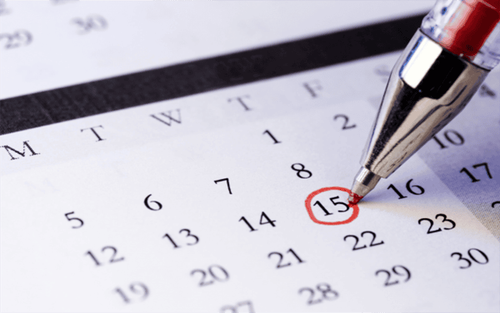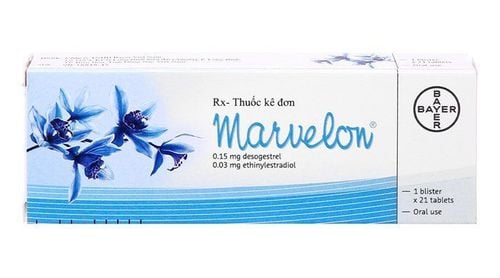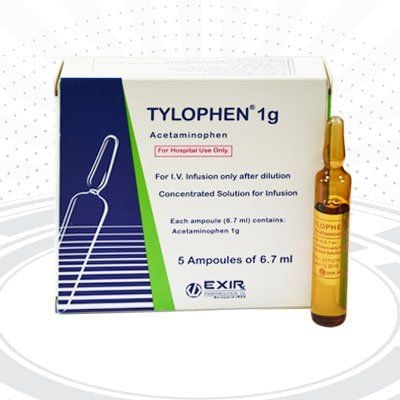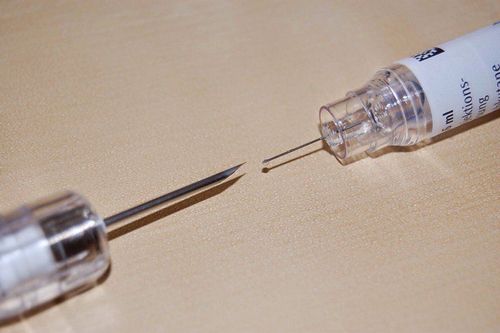This is an automatically translated article.
Dysmenorrhea is sharp pain or cramping in the lower abdomen. Many women who experience dysmenorrhea just before and during their period need medication to ease the pain. So is taking menstrual pain relievers harmful?1. Symptoms of menstrual pain
For some women, periods are just uncomfortable, but for others, menstrual cramps are quite severe, interfering with daily activities.Conditions like endometriosis or uterine fibroids can cause dysmenorrhea. Treating the cause is key to reducing the pain. Dysmenorrhea is not caused by another medical condition, tends to decrease with age, and usually improves after childbirth.
Symptoms of dysmenorrhea include:
Sharp or cramping pain in the lower abdomen, which can be severe; Pain that begins 1 to 3 days before menstruation, peaks 24 hours after menstruation begins, and subsides 2 to 3 days after menstruation; Dull, constant pain; Pain radiates to the lower back and thighs. Some women also have:
Nausea; Diarrhea ; Headache; Dizzy. Dysmenorrhea should see a doctor if:
Severe menstrual pain disrupts life; Symptoms are getting worse; Started having severe menstrual cramps after age 25.
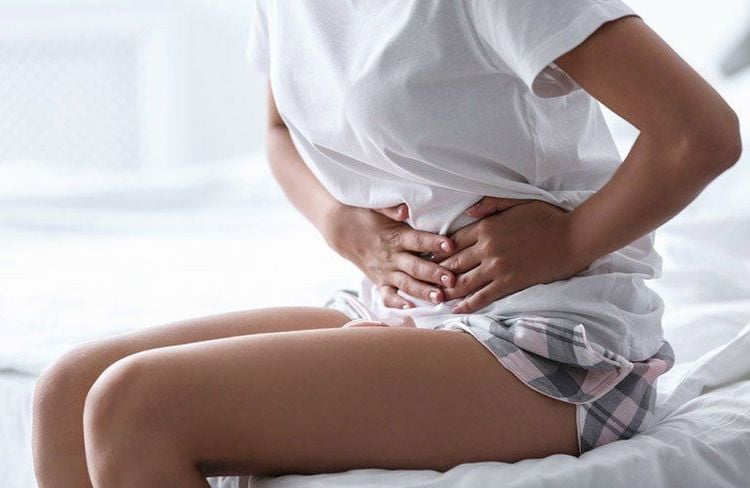
Đối với một số phụ nữ, kỳ kinh nguyệt chỉ mang lại cảm giác khó chịu nhưng đối với những người khác, đau bụng kinh lại khá nghiêm trọng
2. Are menstrual pain relievers effective?
Dysmenorrhea is very common, and most girls and women experience pain of varying intensity at some point in their menstrual cycle. In some women, the pain is so bad that they are unable to perform daily activities such as going to work or school.In women with dysmenorrhea, the uterus often produces too much of the chemical messenger prostaglandin. This leads to painful cramps in the lower abdomen and can also spread to the back or thighs. Benign (non-cancerous) tumors such as fibroids sometimes play a role, too.
Very severe pain during menstruation can also be a symptom of endometriosis, a condition in which the tissue lining the uterus grows outside the uterus.
Anti-inflammatory pain relievers commonly used to relieve menstrual pain, especially diclofenac, ibuprofen, and naproxen. These drugs are all non-steroidal anti-inflammatory drugs (NSAIDs). They inhibit the production of prostaglandins and may help relieve menstrual pain that way. Many NSAIDs are available in pharmacies without a prescription.
Researchers at the Cochrane Collaboration - an international network of researchers searched clinical studies of these drugs to find out if they helped improve menstrual pain. Researchers found 80 studies involving more than 5,800 girls and women between the ages of 12 and 47. These studies compared the effectiveness of pain relievers with a placebo (one that contains no active ingredients). ). The studies included women with and without endometriosis.
Research shows that NSAIDs can relieve pain and are more effective than placebo in reducing menstrual pain:
Several other studies have compared NSAIDs to acetaminophen (paracetamol) and found NSAIDs to be effective. slightly better than acetaminophen in reducing menstrual pain.
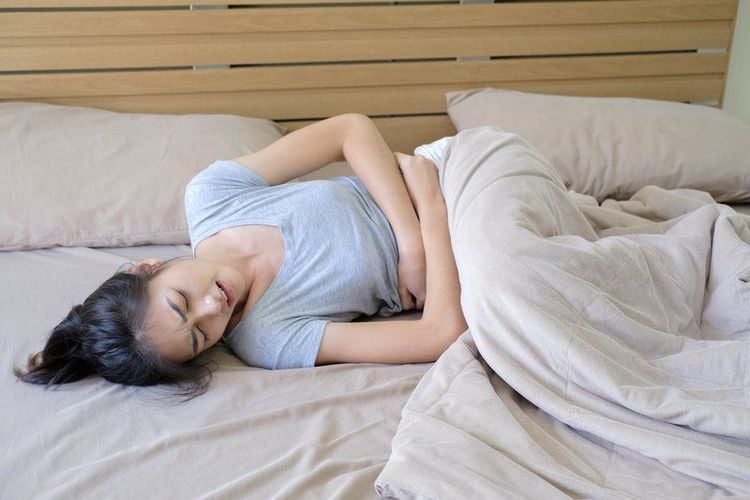
Đau bụng kinh thường rất phổ biến, hầu hết các bé gái và phụ nữ bị đau với cường độ khác nhau vào một thời điểm nào đó trong kỳ kinh nguyệt
3. Side effects of dysmenorrhea drugs
Are menstrual pain relievers harmful? Studies have shown that taking NSAID pain relievers can sometimes cause side effects, namely that 2-3 out of every 100 girls and women experience stomach problems, nausea, headache or drowsiness.Other less common side effects: Abnormal liver function Very rare side effects: Blood disorders Skin disorders: blistering and peeling skin (Stevens - Johnson syndrome) Allergic reactions: Angioedema maculopapular rash Pustular rash Acute liver failure Thrombocytopenia in the blood Atopic dermatitis Neutropenia Agranulocytosis Vocal cord swelling
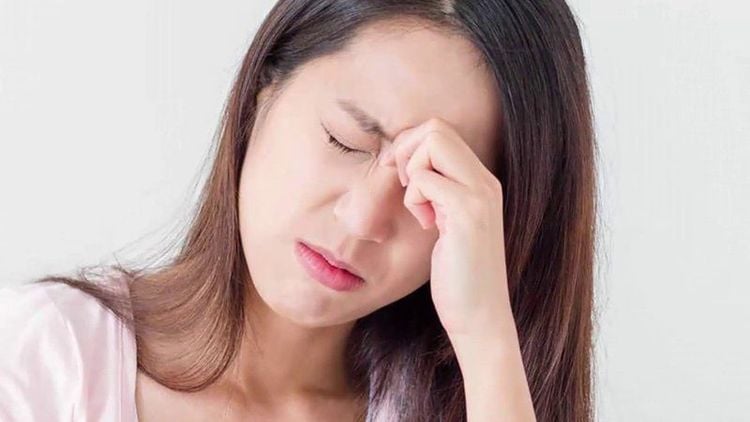
Một số người sử dụng thuốc giảm đau bụng kinh có thể gặp vấn đề về dạ dày, đau đầu, buồn nôn hoặc buồn ngủ
4. Non-drug menstrual pain relief measures
4.1.Lifestyle change measures Besides getting enough sleep and rest, things you should try to limit the use of menstrual pain relievers during your period:Regular exercise: physical activity, including sex, which helps relieve menstrual cramps for some women. Use heat: Soaking in a hot tub or using a heating pad, hot water bottle, or heat patch on your lower abdomen can ease menstrual cramps. Try a supplement: Some studies have shown that supplementing with vitamin E, omega-3 fatty acids, vitamin B1 (thiamin), vitamin B6 and magnesium can reduce menstrual pain. Reduce stress: Psychological stress can increase the risk of menstrual cramps and their severity. 4.3. Alternative medicine Most of the alternative medicine used to treat menstrual pain is still not well researched by experts. However, some alternative treatments are quite effective, including:
Acupuncture: some studies have found that acupuncture helps relieve menstrual pain. Transcutaneous electrical nerve stimulation (TENS): a TENS device connected to the skin by patches with electrodes that deliver varying degrees of electrical current to stimulate nerves. TENS works by raising the threshold for pain signals and stimulating the release of the body's natural pain relievers (endorphins). In studies, TENS was more effective than placebo at reducing menstrual pain. Acupressure: like acupuncture, acupressure also involves stimulating certain points on the body, but with gentle pressure on the skin instead of needles. Although research on acupressure reducing menstrual pain is limited, it appears that acupressure may be more effective than a placebo in reducing menstrual pain.
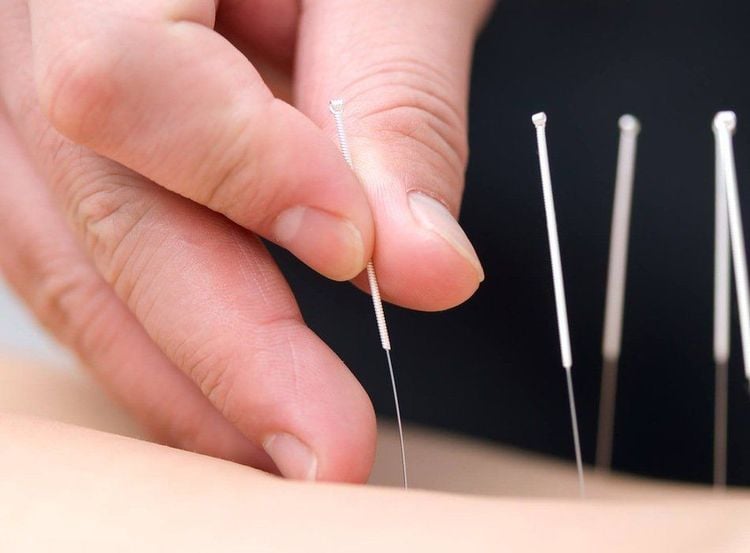
Một số nghiên cứu phát hiện ra rằng châm cứu giúp giảm đau bụng kinh
Please dial HOTLINE for more information or register for an appointment HERE. Download MyVinmec app to make appointments faster and to manage your bookings easily.




